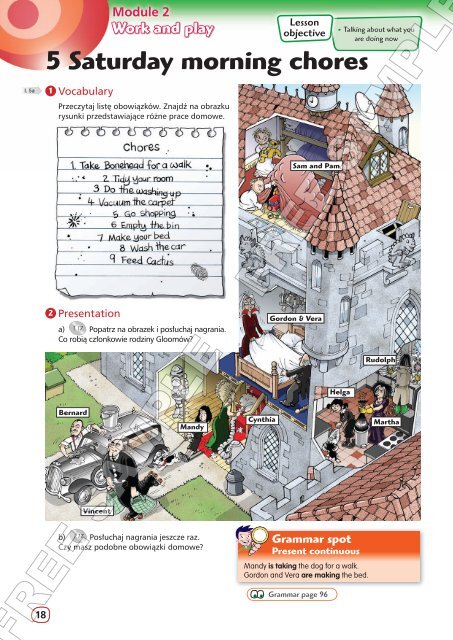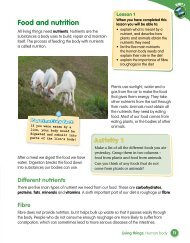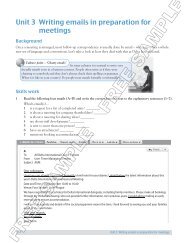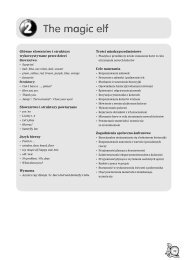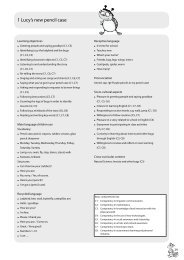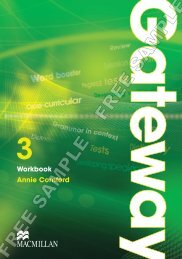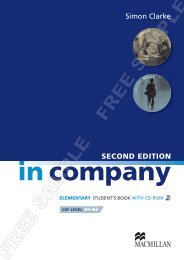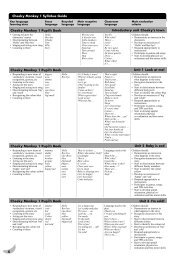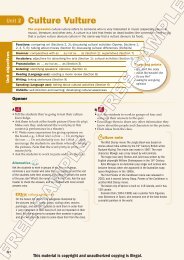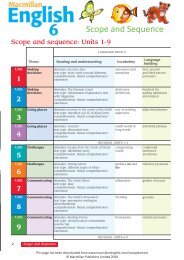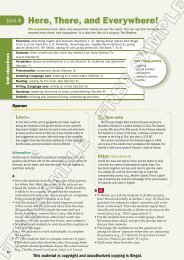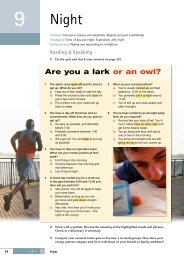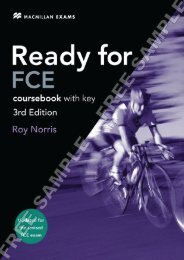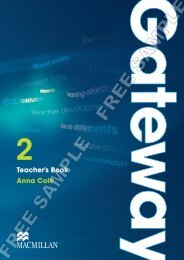Pobierz - Macmillan
Pobierz - Macmillan
Pobierz - Macmillan
Create successful ePaper yourself
Turn your PDF publications into a flip-book with our unique Google optimized e-Paper software.
l. 5a<br />
18<br />
1 Vocabulary<br />
Module 2<br />
Work and play<br />
Przeczytaj listę obowiązków. Znajdź na obrazku<br />
rysunki przedstawiające różne prace domowe.<br />
b) 1.17 Posłuchaj nagrania jeszcze raz.<br />
Czy masz podobne obowiązki domowe<br />
Lesson<br />
objective<br />
5 Saturday morning chores<br />
2 Presentation<br />
a) 1.17 Popatrz na obrazek i posłuchaj nagrania.<br />
Co robią członkowie rodziny Gloomów<br />
Bernard<br />
Vincent<br />
Mandy<br />
Cynthia<br />
Sam and Pam<br />
Gordon & Vera<br />
Grammar spot<br />
Present continuous<br />
Mandy is taking the dog for a walk.<br />
Gordon and Vera are making the bed.<br />
Grammar page 96<br />
• Talking about what you<br />
are doing now<br />
Helga<br />
Rudolph<br />
Martha<br />
FREE SAMPLE FREE SAMPLE
l. 5b<br />
3 Grammar practice<br />
Popatrz na obrazek z ćwiczenia 2. Napisz, jakie<br />
prace wykonują członkowie rodziny Gloomów.<br />
Użyj słów z ramki.<br />
wash empty take go make<br />
do vacuum feed tidy<br />
1 Sam and Pam are tidying their room.<br />
2 Mandy’s taking Bonehead for a walk.<br />
1 Sam and Pam their room.<br />
2 Mandy Bonehead for a walk.<br />
3 Martha the bin.<br />
4 Bernard the car.<br />
5 Gordon and Vera the bed.<br />
6 Vincent shopping.<br />
7 Cynthia the carpet.<br />
8 Rudolph the washing up.<br />
9 Helga Cactus.<br />
4 Speaking<br />
a) Znajdź poniższe rzeczy na rysunku<br />
z ćwiczenia 2.<br />
raincoat rubber gloves toothbrush<br />
fish roller skates toys<br />
b) 1.18 Posłuchaj pytań. Zastanów się nad<br />
odpowiedziami.<br />
1 What’s Bernard washing with his toothbrush<br />
2 What are Sam and Pam putting under the rug<br />
3 What’s Cactus eating<br />
4 What’s Martha wearing on her hands<br />
5 What’s Rudolph wearing<br />
6 What’s Vincent wearing on his feet<br />
c) Pracujcie w parach. Na zmianę zadawajcie<br />
sobie pytania i udzielajcie odpowiedzi.<br />
What’s Bernard washing<br />
with his tootbrush<br />
5 Class poll<br />
His car.<br />
a) Pracujcie w parach lub w małych grupach.<br />
Ułóżcie listę obowiązków domowych.<br />
Look after my little brother/sister<br />
Wash the clothes<br />
b) Dowiedzcie się, ile osób z klasy wykonuje te<br />
obowiązki. Zapiszcie wyniki na tablicy.<br />
6 Listening<br />
a) 1.19 Posłuchaj nagrania. Dopasuj zdania<br />
do obrazków.<br />
He’s having a shower. She’s closing the window.<br />
They’re riding their bikes. They’re cleaning their teeth.<br />
She’s brushing her hair. He’s opening the door.<br />
1 She’s brushing her hair.<br />
b) Pracujcie w parach. Na zmianę zadawajcie<br />
sobie pytania dotyczące obrazków i udzielajcie<br />
odpowiedzi.<br />
What’s he/she doing / What are they doing<br />
He’s/She’s/They’re …<br />
What’s she doing<br />
7 Check your English<br />
a) Uzupełnij zdania czasownikami podanymi<br />
w nawiasach. Użyj czasu present continuous.<br />
A: What you (do)<br />
B: I my room. (tidy)<br />
A: Where she (go)<br />
B: She to school. (go)<br />
b) Popatrz na obrazek z ćwiczenia 2. Napisz<br />
trzy pytania zaczynające się od What’s …,<br />
które zadasz koledze/koleżance. Następnie<br />
zamknij książkę i wraz z kolegą/koleżanką<br />
zadawajcie sobie na zmianę pytania<br />
i udzielajcie odpowiedzi.<br />
What’s Cynthia vacuuming<br />
She’s brushing her hair.<br />
The carpet.<br />
FREE SAMPLE FREE SAMPLE<br />
1<br />
3<br />
5<br />
2<br />
4<br />
6<br />
19<br />
2
l. 6a<br />
20<br />
6 Work and play<br />
1 Presentation<br />
a) 1.20 Posłuchaj nagrania i przeczytaj tekst.<br />
SURVEY How often do you ...<br />
WORK<br />
1 tidy your room 2 do the washing up<br />
3 go food shopping 4 lay the table<br />
Lesson<br />
objective<br />
b) 1.21 Posłuchaj odpowiedzi Iana i uzupełnij zdania słowami z ramki.<br />
1 He tidies his room once or twice a week.<br />
once twice three four every never<br />
morning day Sunday week weekend month<br />
1 He tidies his room or a .<br />
2 He does the washing up or times a .<br />
3 He goes food shopping.<br />
4 He lays the table for dinner every .<br />
5 He goes swimming every Saturday .<br />
6 He plays computer games every .<br />
7 He surfs the Internet every .<br />
8 He hangs out with his friends day after school.<br />
c) 1.21 Posłuchaj nagrania jeszcze raz i sprawdź<br />
odpowiedzi.<br />
PLAY<br />
• Talking about how often<br />
you do things<br />
5 go swimming 6 play computer games<br />
7 surf the Internet 8 hang out with friends<br />
Grammar spot<br />
Expressions of frequency<br />
How often does he tidy his room<br />
He tidies his room once or twice a week.<br />
How often does he go swimming<br />
He goes swimming every Saturday morning.<br />
Grammar page 97<br />
FREE SAMPLE FREE SAMPLE
l. 6b<br />
2 Speaking<br />
a) Uzupełnij kwestionariusz z ćwiczenia 1. informacjami<br />
na swój temat. Nie pokazuj odpowiedzi innym osobom<br />
z klasy.<br />
1 twice a week, 2 every weekend, 3 every morning.<br />
4 never …<br />
b) Pracujcie w parach. Na zmianę zadawajcie sobie pytania<br />
i udzielajcie odpowiedzi.<br />
How often do you tidy your room<br />
c) Napisz trzy prawdziwe zdania na temat kolegi/koleżanki.<br />
She plays computer games every evening. She goes<br />
swimming …<br />
3 Grammar Practice<br />
Adverbs of frequency<br />
I tidy my room twice a week.<br />
a) Napisz pięć zdań o tym, co robisz po lekcjach.<br />
Użyj wyrażeń podanych w ramkach.<br />
I<br />
1 I always do the washing up after school.<br />
2 I usually hang out with my friends after school.<br />
3 …<br />
b) Powiedz koledze/koleżance, jak często wykonujesz<br />
różne czynności.<br />
4 Writing<br />
always<br />
usually<br />
often<br />
sometimes<br />
never<br />
do my homework<br />
tidy my room.<br />
do the washing up<br />
have a snack<br />
go swimming<br />
surf the Internet<br />
watch TV<br />
hang out with friends<br />
I sometimes go swimming after school.<br />
a) Napisz trzy pytania do kolegi/koleżanki, zaczynające się<br />
od How often …<br />
1 How often do you walk to school<br />
b) Wymieńcie się pytaniami. Napisz odpowiedzi na<br />
pytania kolegi/koleżanki.<br />
1 How often do you walk to school Every day.<br />
after school.<br />
My English file<br />
Napisz trzy dodatkowe zdania o Tidy Tedzie.<br />
5 Song<br />
1.22 Na stronie 90 znajdziesz tekst<br />
piosenki Rock star.<br />
6 Check your English<br />
a) 1.23 Posłuchaj nagrania. Dowiedz<br />
się, co robi Nyree w podanym czasie.<br />
once or twice a week<br />
always sometimes often<br />
every Saturday afternoon<br />
three or four times a week<br />
b) 1.23 Posłuchaj nagrania jeszcze raz.<br />
Wszystkie podane zdania są błędne.<br />
Popraw je.<br />
1 Nyree sometimes tidies her room.<br />
2 She never looks after her little sister.<br />
3 She does the washing up every day.<br />
4 She goes swimming three or<br />
four times a month.<br />
5 She goes to the cinema every day.<br />
6 She sometimes hangs out with her<br />
friends after school.<br />
FREE SAMPLE FREE SAMPLE<br />
21<br />
2
l. 7a<br />
22<br />
1 Vocabulary<br />
Lesson<br />
objectives<br />
7 Saving the world<br />
1.24 Znajdź na obrazkach rzeczy wymienione w ramce.<br />
2 Presentation<br />
• Talking about things we usually or always do<br />
• Talking about things we are doing now<br />
plastic bottles metal cans glass jars<br />
paper cardboard boxes lorry rubbish<br />
a) 1.25 Posłuchaj nagrania i przeczytaj tekst. Co robią osoby przedstawione na obrazkach<br />
We don’t throw away rubbish at our<br />
school. We recycle it and put the<br />
rubbish into the correct recycling box.<br />
We all recycle at our school.<br />
This is our school secretary<br />
and she’s putting the old paper<br />
into the green recycling box.<br />
b) 1.25 Posłuchaj nagrania jeszcze raz. Czy w waszej szkole segreguje się śmieci<br />
3 Comprehension<br />
4<br />
1<br />
Recycle!<br />
This bottle’s made of plastic and I’m<br />
recycling it. I’m putting it into the<br />
yellow recycling box.<br />
And that’s our school cook. Those jars<br />
and bottles are made of glass and he’s<br />
recycling them. That box is made of<br />
cardboard. We collect all cardboard<br />
boxes at our school and recycle them.<br />
Popatrz na obrazki ćwiczenia 2. i przeczytaj ponownie tekst.<br />
Odpowiedz na pytania.<br />
1 What are the children holding in picture 1<br />
2 What’s the bottle made of in picture 2<br />
3 Is the girl throwing away the cans in picture 3<br />
4 Where is the secretary putting the paper<br />
5 Is the cook recycling the glass<br />
6 How often does the lorry come to the school<br />
5<br />
2<br />
I’m not throwing these cans<br />
away. They’re made of metal<br />
and I’m putting them into the<br />
blue recycling box.<br />
A big lorry comes to the school<br />
every Friday and collects all our<br />
paper, cardboard, glass, metal and<br />
plastic for recycling.<br />
Grammar spot<br />
It/them<br />
This bottle’s made of plastic.<br />
I’m recycling it.<br />
Those jars are made of glass and<br />
he’s recycling them.<br />
Grammar page 99<br />
FREE SAMPLE FREE SAMPLE<br />
3<br />
6
l. 7b 4 Speaking<br />
5 Grammar practice<br />
a) Pracujcie w parach. Na zmianę zadawajcie<br />
sobie pytania i udzielajcie odpowiedzi na temat<br />
poniższych przedmiotów.<br />
What’s the bottle made of<br />
What are the wrappers made of<br />
1 2 3<br />
bottle<br />
packet<br />
wrappers<br />
4 5 6<br />
pots<br />
b) 1.26 Posłuchajcie nagrania i sprawdźcie<br />
odpowiedzi.<br />
c) Dopasujcie poszczególne przedmioty<br />
z ćwiczenia 4a) do właściwego pojemnika.<br />
Where does the bottle go<br />
It’s made of glass.<br />
They’re made of ...<br />
can<br />
jar<br />
It goes in the green box.<br />
Where do the wrappers go<br />
Grammar spot<br />
Present simple/<br />
present continuous<br />
Present simple<br />
We always recycle rubbish.<br />
We collect all cardboard boxes.<br />
Present continuous<br />
I’m recycling this bottle.<br />
She’s putting the paper into the green recycling box.<br />
Grammar page 98<br />
a) Popatrz na pokój dziewczynki. Co zauważyłeś/<br />
zauważyłaś<br />
1 She plays tennis/football.<br />
2 She likes sweets/chocolate.<br />
3 She goes swimming/ice-skating.<br />
4 She wears jeans/skirts.<br />
5 She reads books/magazines.<br />
b) Popatrz na obrazek jeszcze raz. Co robi<br />
dziewczynka Które trzy zdania są poprawne<br />
1 She’s playing football.<br />
2 She’s eating a chocolate bar.<br />
3 She’s ice-skating.<br />
4 She’s wearing jeans.<br />
5 She’s reading a book.<br />
6 Check your English<br />
a) Czy poniższe zdania są prawdziwe (T – True),<br />
czy fałszywe (F – False) w odniesieniu do ciebie<br />
1 I often eat chocolate.<br />
2 I’m eating a bar of chocolate.<br />
3 I usually wear jeans.<br />
4 I’m wearing jeans.<br />
b) Znajdź w klasie przedmioty wykonane z:<br />
1 glass 2 plastic 3 cardboard 4 metal 5 paper<br />
FREE SAMPLE FREE SAMPLE<br />
23<br />
2
l. 8a<br />
24<br />
8 Helping at home<br />
1 Reading<br />
Ruth, 13<br />
2<br />
a) 1.27 Posłuchaj nagrania i przeczytaj<br />
tekst. Dowiedz się, co oznacza symbol<br />
pokazany na zdjęciu 1.<br />
My home’s a B&B or a Bed and<br />
Breakfast. A B&B is a house with one<br />
or two bedrooms for paying guests.<br />
In my house there are five bedrooms:<br />
two are for guests and three are<br />
for my family. We’ve also got two<br />
bathrooms: one for the guests and<br />
the other for us.<br />
Billy, 12<br />
b) Przeczytaj tekst jeszcze raz. Odpowiedz na pytania.<br />
1 They live in a B&B.<br />
1 Where do Billy and his family live<br />
2 What is a B&B<br />
3 How does Billy help at the B&B<br />
4 How does Ruth help at the B&B<br />
5 What are Billy and Ruth doing in Picture 2<br />
6 Can you name the different kinds of food in Picture 3<br />
1<br />
Skills<br />
Cross-cultural<br />
I can give information about<br />
myself and other people.<br />
Durham, England<br />
In the school holidays, my sister Ruth<br />
and I help our parents at our B&B. I help<br />
my mum make the beds and vacuum<br />
the guests’ bedrooms. My sister’s good<br />
at cooking so she helps our dad cook<br />
breakfast. Breakfast is very important<br />
in a B&B and our guests usually want a<br />
full English breakfast with eggs, bacon,<br />
sausage, tomatoes, mushrooms and<br />
beans. We also help our parents with<br />
another important job: talking to the<br />
guests and answering their questions.<br />
FREE SAMPLE FREE SAMPLE<br />
3
3<br />
2 Listening<br />
a) 1.28 Posłuchaj wypowiedzi Adili. W jaki<br />
sposób dziewczynka pomaga swojej mamie<br />
b) 1.28 Posłuchaj nagrania jeszcze raz. Dopasuj<br />
wyrażenia z ramki do obrazków.<br />
fetch water from the well cooking dinner<br />
collect wood for the fire shaking out the rugs<br />
sweeping the floor<br />
1<br />
Fun spot<br />
Word mountain<br />
a) Uzupełnij<br />
ł graf wyrazowy podanymi słowami. ł 1 Musical instrument<br />
2 Containers<br />
3 Types of hair<br />
4 Sports<br />
5 Materials<br />
6 Chores<br />
4<br />
2<br />
Adila, 11,<br />
Dar es Salaam,<br />
Tanzania<br />
keyboards<br />
b) 1.29 Posłuchaj łuchajnagraniaisprawdź i odpowiedzi.<br />
5<br />
3 Speaking<br />
Pracujcie w parach lub małych grupach.<br />
Na zmianę zadawajcie sobie pytania<br />
i udzielajcie odpowiedzi.<br />
Where do Billy and Ruth live<br />
1 Where do Billy and Ruth live<br />
2 How many bedrooms has their house got<br />
3 How do Billy and Ruth help their parents<br />
4 What’s a full English breakfast<br />
5 Where does Adila live<br />
6 How does Adila help her mum<br />
7 Why does Adila like going to the well<br />
4 Writing<br />
They live in a B&B.<br />
l. 8b<br />
W jaki sposób pomagasz w obowiązkach<br />
domowych Napisz listę rzeczy, które robisz<br />
i przy których pomagasz. Wykorzystaj<br />
ćwiczenia 1. i 2. jako podpowiedzi.<br />
I usually help do the washing up.<br />
I sometimes look after my little sister.<br />
I tidy my room.<br />
I help my dad in the garden.<br />
bottle<br />
skiing<br />
paper<br />
curly<br />
make the bed<br />
keyboards<br />
tidy the room<br />
straight<br />
wavy<br />
skating<br />
metal<br />
cardboard<br />
sailing<br />
box<br />
do the washing up<br />
plastic<br />
surfing<br />
glass<br />
lay the table<br />
vacuum um the carpet<br />
empty the bin<br />
FREE SAMPLE FREE SAMPLE<br />
25<br />
2
26<br />
Review<br />
Check you can do these things.<br />
1 Potrafię używać czasu present continuous, aby powiedzieć o tym, co się teraz dzieje.<br />
1<br />
5<br />
Uzupełnij dialog odpowiednimi formami czasowników podanych w nawiasach. Użyj czasu present<br />
continuous.<br />
A: Hi, Kim. What you (do)<br />
B: I TV. (watch)<br />
A: What you (watch)<br />
B: A quiz show. you your homework (do)<br />
A: No, I’m not. I a book. (read)<br />
B: What your brother (do)<br />
A: He computer games. (play)<br />
B: he Magic Mountain (play)<br />
A: I don’t know.<br />
2 Znam nazwy ośmiu obowiązków domowych.<br />
Co robią dzieci pokazane na obrazkach Ułóż zdania z He’s / She’s / They’re …<br />
She’s laying the table.<br />
2<br />
6<br />
3 Umiem prawidłowo użyć wyrażeń opisujących częstotliwość.<br />
Ułóż cztery prawdziwe zdania na swój temat, używając:<br />
1 every day 2 once or twice a week 3 every afternoon 4 two or three times a month<br />
I watch TV every day.<br />
3<br />
7<br />
FREE SAMPLE FREE SAMPLE<br />
4<br />
8
4 Potrafię prawidłowo użyć przysłówków częstotliwości.<br />
Napisz cztery prawdziwe zdania na swój temat, używając: always, often, usually, sometimes, never.<br />
1 I always walk to school.<br />
1 I walk to school. 3 I surf the Internet.<br />
2 I hang out with my friends after school. 4 I get up early.<br />
5 Umiem prawidłowo użyć czasu present simple i czasu present continuous.<br />
Wybierz właściwe słowa i uzupełnij pocztówkę.<br />
1 write/‘m writing 2 listen/‘m listening 3 come/‘m coming 4 play/‘m playing<br />
5 go/‘m going 6 doesn’t like/isn’t liking 7 sits/’s sitting<br />
6 Umiem powiedzieć, z czego wykonane są różne przedmioty.<br />
It’s made of glass.<br />
1 2 3 4 5 6<br />
4<br />
5<br />
1<br />
6<br />
Ułóż zdania rozpoczynające się od It’s / They’re made of … Pierwsze litery szukanych słów zostały<br />
podane.<br />
g c m p p g<br />
7<br />
FREE SAMPLE FREE SAMPLE<br />
3<br />
2<br />
27<br />
2
28<br />
Extra<br />
special<br />
1 1.30 Posłuchaj nagrania. Dopasuj opisy do obrazków.<br />
b<br />
Guess the object<br />
a<br />
f<br />
1 It’s made of paper. It’s new. It’s got a picture on the front. You read it.<br />
2 They’re pink and white. You wear them on your feet. They’re expensive.<br />
3 It’s round. It’s made of leather. It’s black and white. You can play with it.<br />
4 It’s long and thin. It’s made of plastic. You can measure and draw lines with it.<br />
5 They’re made of wood. They’ve got four legs. You can sit on them. You can see<br />
them in your classroom.<br />
6 They’re made of sugar. They’re very sweet. They’re different colours.<br />
Children like them. You can eat them.<br />
7 It’s made of metal. It’s white, yellow and green. You drink from it.<br />
i<br />
8 It’s made of plastic. It’s long and thin. It’s blue. You can write with it.<br />
d<br />
9 It’s quite big and heavy. It’s made of leather. It’s brown. You can carry things in it.<br />
FREE SAMPLE FREE SAMPLE<br />
e<br />
c<br />
h<br />
g
2 Pomyśl o jakiejś rzeczy. Nie mów o niej<br />
innym osobom z klasy.<br />
3 Pracujcie w parach. Na zmianę zadawajcie<br />
sobie pytania, aby odgadnąć, o czym każde<br />
z was myśli.<br />
Is it/Are they made of wood/plastic/metal/<br />
glass/cardboard/silver/leather/sugar …<br />
Is it/Are they big/small/long/short/thick/<br />
thin/new/expensive …<br />
Is it/Are they black/white/yellow/brown/<br />
red/blue/green …<br />
Can I see it/them in the classroom/at home/<br />
in a shop …<br />
Can I eat/wear/hold/read … it/them<br />
Can I play/write … with it/them<br />
Are they big<br />
Yes, they are.<br />
Can I see them in the classroom<br />
Can I wear them<br />
No, you can’t.<br />
Yes, you can.<br />
<br />
Mini<br />
project<br />
1 Przeczytaj tekst o robocie Jasminy. Czy masz<br />
jakieś pomysły, co jeszcze potrafi robić jej robot<br />
My Useful Robot<br />
My robot makes breakfast every<br />
morning.<br />
She does my Maths homework.<br />
She sings to me every night.<br />
She brings me<br />
breakfast in bed on<br />
Sunday mornings.<br />
She tidies and cleans my room.<br />
She looks after my little brother.<br />
She eats the food<br />
I don’t like.<br />
2 Wymyśl swojego robota i opisz go. Może być<br />
to np. robot sportowy, inteligentny robot,<br />
śmieszny robot itp. Dodaj rysunki do opisu.<br />
3 Wymień się swoim opisem z osobami z klasy.<br />
Wybierzcie najbardziej użytecznego robota.<br />
FREE SAMPLE FREE SAMPLE<br />
29<br />
2


